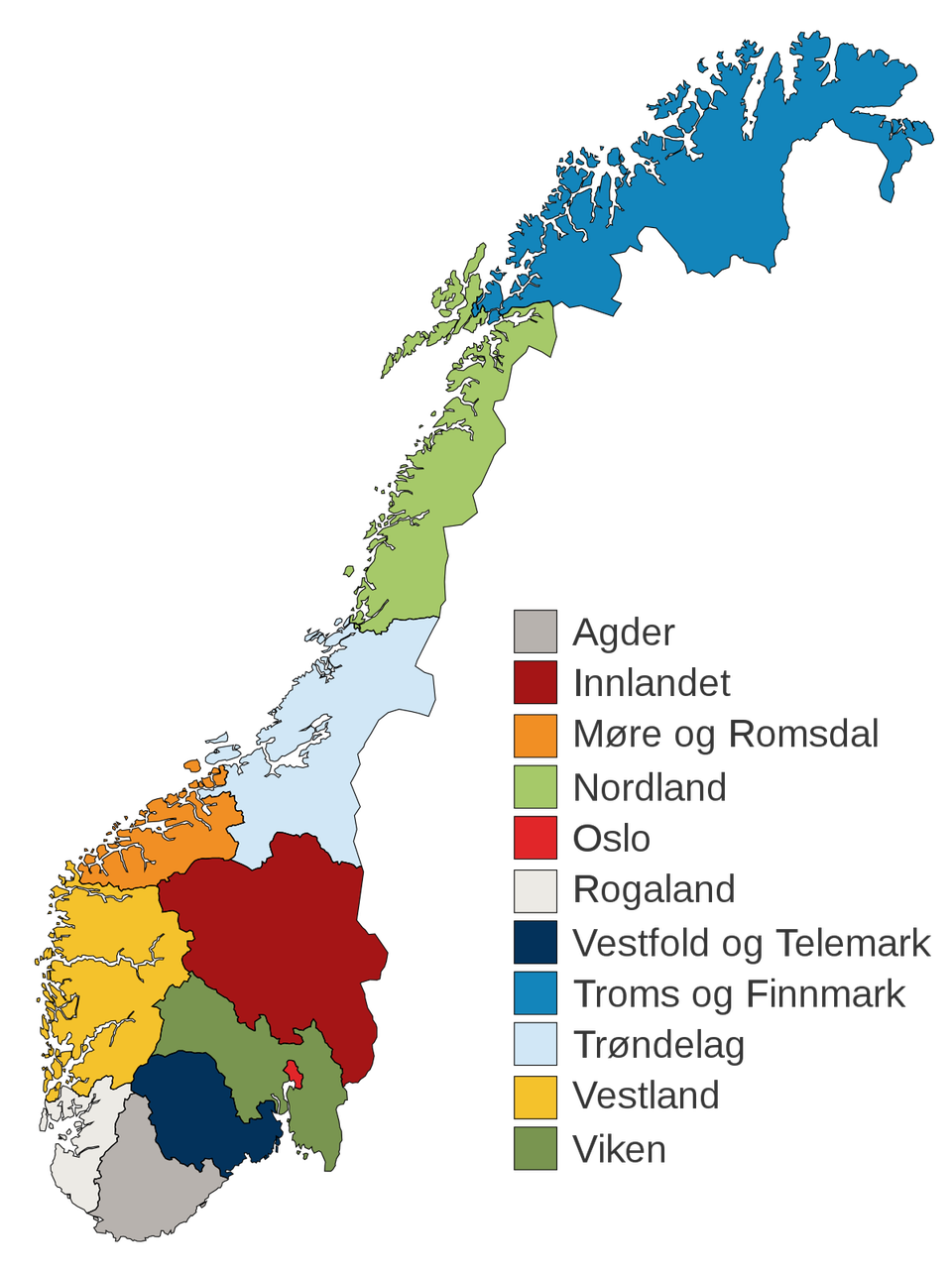
The purpose of the Training program has been to establish a common conceptual framework and understanding of the opportunities to create the necessary transformation. Participants have worked to develop their digital mindset and established a common language for the nec-essary capabilities that digital transformation requires from leaders and organizations. Going forward, the ambition of the municipalities is to leverage digitalization and technologies to deliver coherent, sustainable services with the citizen at the center.
The Training programs have been implemented at county level through digitalization networks, Digi Networks. The Digi Networks have been responsible for coordinating the participation of the municipalities from the different counties, and the participants have primarily been municipal directors, their management teams and selected managers from HR, digitalization, and IT departments.
"In Orkland Municipality, both the strategic management group and the digitalization group have been involved in the Training program for digital transformation. This has given us a common platform, understanding and tools that we have continuously used both strategically and operationally. The mindset behind the Training program is now implemented in the com-munity part of the municipal plan and action plan with budget. The work is also guiding the thematic plan for digitalization that we will discuss politically this year. In addition, it has giv-en us networks and partners."
Eivind Sperre Austnes, Manager - Communication and Digitalization, Orkland Municipality

In Norway 15 geographical re-gions or counties are called fylkeskommuner.
Digi Networks, or digitalization networks, are networks between municipalities that aim to provide better digital services to citizens and businesses. KS, Kom-munesektoren Organisasjon, which corresponds to the Danish KL, Kommunernes Landsforening, coordinates the networks.
Through the program, the municipalities have gained inspiration on how they can use tech-nology and data to implement digital transformation in their organizations and integrate the goal of digital maturity and sustainability into their strategies.
The Training program is structured around four key areas and organized in four modules: strategy, technology, organization and leadership. These modules are developed based on research-based knowledge and organized with a focus on different learning styles, including immersion, co-creation, technology-enhanced learning and physical and digital sessions with professional presentations and dialogue.
Within each of these modules, participants are guided through a process of identifying oppor-tunities and challenges and launching concrete initiatives. This ensures a hands-on approach where the learning is translated into the organizations as part of the course.
1) Preparation: Common un-derstanding
Independent work with theory and cases (a learning platform is available for this).
Group work around a given challenge that aims to inspire and challenge the leadership team.
2) Assembly: Current starting point
Physical or digital day across management teams, alternating between academic presen-tations, cases and facilitated dialog and knowledge sharing.
Mapping and working with your own organi-zation's starting point, including barriers and opportunities.
3) Post-work: Further action
The leadership team works locally with the key learning points of the module and with setting their own ambition and discussing short and long term actions in relation to the module theme.
Each Training program has been tailored and adapted to the participating municipalities to ensure that managers and employees across the municipalities have gained practical learning from examples in the region, and the content of each course has been a combination of re-search-based theory with concrete examples and cases from municipalities of varying sizes.
There has been an emphasis on both individual and collective technology-supported learning, and a focus on collaboration and dialog in the management teams in this context. The partic-ipants have also participated in assemblies across municipal boundaries, where, in addi-tion to continuing to work with their own management teams, they have exchanged ex-periences and been inspired by various initiatives and efforts from other municipalities.
During the modules, work has been done to create awareness of development needs in both organizational capabilities, digital maturity and organizational competence management, us-ing DI2X's self-assessment Tools. Participants have mapped their organizations' maturity and capabilities for digital transformation, and the results have been used to create awareness and also motivation for change.
Digital transformation is essential to ensure that municipalities can deliver sustainable and proactive services to citizens in the future. This requires an understanding of the current digi-tal maturity of the municipalities and how digitally mature they need to become in order to realize their goals. A key factor for successful digital transformation is therefore recognizing management's responsibility and role in the digital maturity of municipalities:
"It's important to change our competencies and close the gap between where we are today and where we need to be in the near future," says Tine Sundtoft, County Director of Agder County Council, who has participated in the program and continues: "Understanding what is required in the different generations of digital maturity is important - and we recognize that we are under pressure," she shares. By focusing on competence development and leadership approaches to digital transformation, the Training program is not just about adapting to to-day's demands, but also about preparing for future challenges with a proactive approach.
"We have begun a journey, and all leaders are more aware of what is required in the future in terms of engagement and working with digital transformation - this is very positive. Important-ly, the leaders who have participated have had an interest and desire to be the driving force for digital development in the organization."
Aud Sunniva Fuhr, Municipal Director, Sirdal Municipality.

The Training program have equipped municipal leaders to rethink the use of technology, how they can be efficient while developing the municipality's offers and services in a timely manner with the basic needs of citizens at the center. The learning that the participants have gained enables a development that equips Norwegian municipalities to meet future expecta-tions. As Bodil Sivertsen, Director of Sandnes Municipality, points out:
"Municipalities need to succeed in digital transformation to meet the challenges of tomorrow. We've needed train our capabilities to meet this with anticipation - not resistance. And the more we learn, the more opportunities we see."

The Training program and the collaboration between the participating municipalities, both strengthened managers' skills, and created a common language and understanding of digital transformation across municipalities and counties in Norway. And the fact that around 260 municipalities have participated has also helped to strengthen municipal leadership across Norwegian municipalities.
The Training program have resulted in a wide range of different initiatives and changes in municipal practice. Here are some examples:
Digi networks are increasingly proving to be a success factor within the collaboration structure in the Norwegian public sector. For example, the networks work closely with the Norwegian Digitalisation Agency to manage services related to citizens' life events, to ensure that citizens have a seamless experience across public services when, for example, they have children or deal with death and inheritance. Furthermore, it is essential that the Digi networks are close to what is happening in Digital Shared Services (DIF) through KS in Norway, in order to increase the joint development of solutions and explore opportunities for collaboration on products and services for citizens.
Digital transformation is a process that continues in Norwegian municipalities, both internally within each municipality and through stronger collaborations between municipalities and with external partners.
In spring 2024, an operational version of the Training program will be developed for middle managers and members of the political leadership. This new program will focus on practice-oriented case work, process guides and tools to ensure a broad roll-out of digital mindset in municipal organizations.
Several collaborations have been established in the Norwegian Digi Networks and many initia-tives are under development. Municipalities have intensified their collaboration and are now working closely with other municipalities, counties and the state to strengthen efforts and solve societal challenges together across academia, business and the public sector.
If you are curious to know more about how others have worked on digital transformation in their organization, you can find inspiration in our other cases.